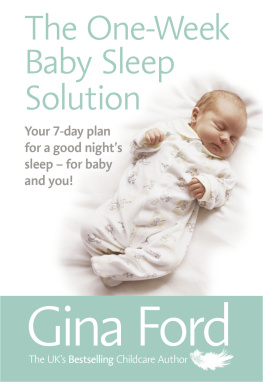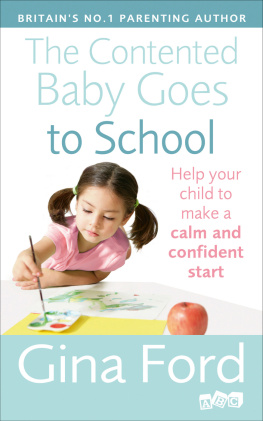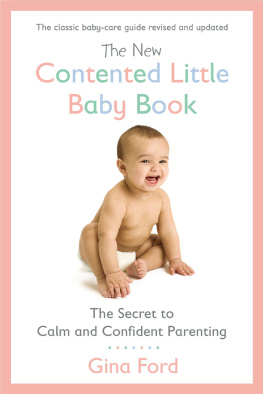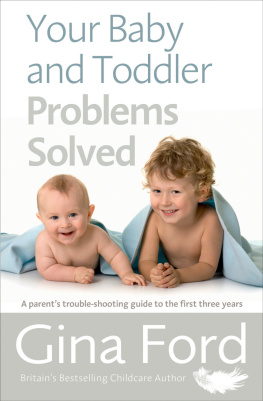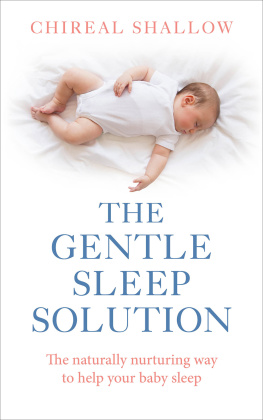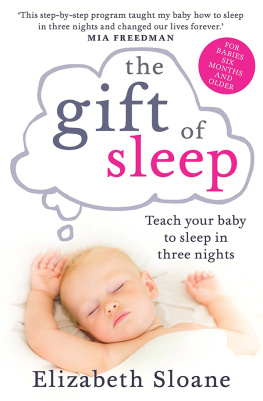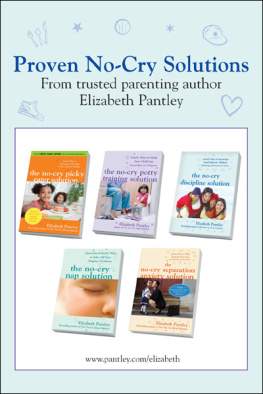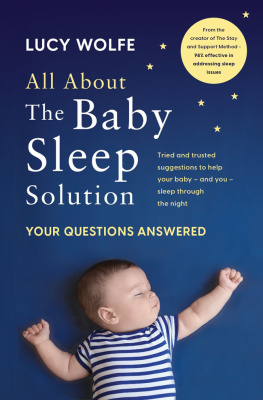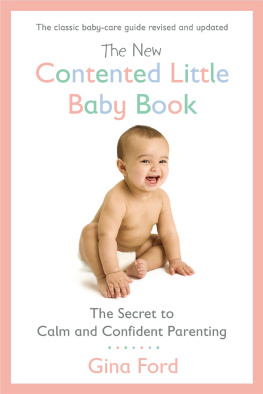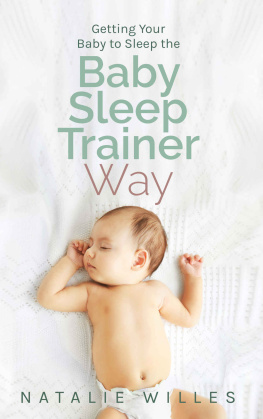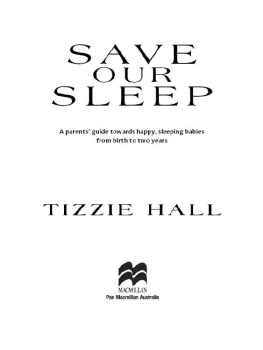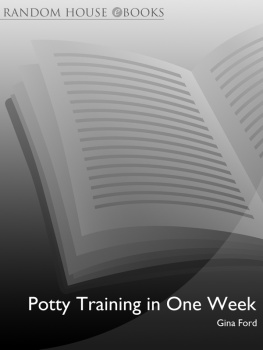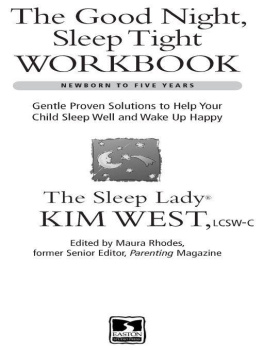Contents
About the Book
Gina Ford has helped thousands of families resolve sleep challenges. In this life-saving new book, she offers gentle, step-by-step plans to tackle a whole range of sleep issues. Whether its feeding to sleep, rocking to sleep, night-waking, co-sleeping or dummy attachment, Gina knows how to fix it.
Full of practical, easy-to-implement advice from the UKs bestselling childcare author, in just seven days The One-Week Baby Sleep Solution will help your baby (and you!) to have a good nights sleep.
About the Author
Gina Fords Contented Little Baby Book became a runaway bestseller when it was first published in 1999. She continues to be the number one bestselling author of childcare books in the UK. Her advice and methods have been a godsend to tired, stressed parents throughout the world and have helped a generation of children go to bed on time and sleep soundly through the night. She runs a hugely popular website: www.contentedbaby.com
Introduction
OVER THE YEARS I have worked with many thousands of parents, and have helped them find solutions to the challenges they were having with their babies and toddlers. My first book, The Contented Little Baby Book (published in 1999), was based on my experiences of working with over 300 babies and their families. Since then I have advised thousands more parents through my consultancy work and the Contented Baby website, www.contentedbaby.com, which I set up to help and support parents as they navigated their way through those early months. Through this direct contact I have become familiar with the most common problems new parents experience, and I know how tired and anxious mums and dads can become when their baby is not sleeping well.
Sleep is probably the most misunderstood and confusing aspect of parenthood. The misconception is that for the first few weeks all the baby will do is feed and sleep. While many do, the fact that that there are now literally hundreds of sleep consultants in the United Kingdom is proof that a great many do not. If your newborn or young baby is one of the latter tense, fretful and difficult to settle please take heart, as this need not be a reflection of your babys future sleep habits.
There is much conflicting advice from childcare experts on how to tackle sleep problems. The majority of experts advise parents with very young babies who are waking up several times a night to wait until the baby is six months old before attempting to resolve the problem. My own personal view is that the longer parents put off trying to resolve excessive night-time waking, the harder it will be to solve problems further down the line.
If your baby has got into a routine of excessive night-time waking or has developed the wrong sleep associations, then the practical advice in this book will help you to instil better sleeping habits in your child. As long as you are prepared to be consistent and persistent, there are many solutions that will help you establish a good sleeping pattern for your child.
Gina
Understanding your Babys Sleep
BEFORE TRYING TO implement the plans in this book, it is very important that you have a basic understanding of the different stages of sleep that babies go through. Filmed research shows that all babies come into a light sleep several times a night, some even waking up fully for short spells. When the wakings are not due to genuine hunger, the research shows that the babies who have learned to self-settle will get themselves back to sleep fairly quickly. Babies who have been rocked, patted or fed to get them to sleep are usually unable to settle themselves to sleep without the attentions that they associate with going to sleep.
Once the wrong sleep associations are created it can be very difficult for a baby to sleep for a longer stretch. A baby who is always rocked, fed or given a dummy to get to sleep will be much more likely to continue to wake several times a night, long after the age when he needs a milk feed to get him through the night (see box for more on this). Because he will naturally come into a light sleep several times a night, he will more than likely need the same comfort to get him back to sleep at each cycle.
SLEEP CYCLES
SLEEP IS DIVIDED into rapid eye movement (REM) sleep, usually referred to as active (or light) sleep, and non-REM sleep, usually referred to as quiet (or deep) sleep. Unlike adults and older babies, who start out in non-REM sleep, a newborn baby goes straight into REM sleep when he first drifts off. During this active sleep, his breathing becomes irregular, his body may twitch or jerk, his eyelids will flicker and his eyes appear to roll. He may even smile or frown. His body uses more oxygen and energy during this cycle than during non-REM sleep. A baby who has gone full term will spend 50 per cent of his sleep cycle in REM sleep. A premature baby will spend about 80 per cent in REM sleep. The rest of the sleep cycle is spent in non-REM sleep.
During non-REM sleep the babys breathing will be slow and regular. There are no eye movements and only the occasional twitch or jerk of the body. This calm sleep cycle allows the babys mind and body to recharge, enabling him to cope with his next awake period. Research shows us that this deep sleep is essential for the healthy development of a babys mental and physical growth.
As Dr Richard Ferber, one of Americas leading authorities in the field of childrens sleep problems, explains in his book Solve Your Childs Sleep Problems, non-REM sleep is well developed at birth but has not evolved into the four distinct stages experienced by older children and adults. It is not until around the second month that a sequence of non-REM sleep stages begins to develop. By three months a baby will first enter sleep in stage one of non-REM a drowsy sleep then quickly pass into stage two a light sleep before reaching stages three and four very deep sleep. The whole cycle lasts around 40 minutes in babies and for toddlers it is around 60 minutes.
I have observed that it is between the ages of eight and twelve weeks that many parents begin to experience problems with their babys daytime sleep, as the different stages of non-REM sleep begin to develop. During the first few weeks, the majority of babies will tend to fall asleep easily often in their baby seat or in their pram or buggy and frequently sleep for several hours at a time. Unfortunately, as the babys sleep cycle develops into more distinct stages of light and deep sleep, he will often find it more difficult to settle back to sleep after the 4050-minute sleep cycle if he is used to sleeping in a bright and busy daytime atmosphere. As the day progresses, the baby gets more and more irritable, and by late afternoon he is often very overtired and fights sleep even more. Parents who dont realise that this fractious behaviour is caused by poor quality daytime sleep resort to feeding, rocking, patting, etc. to help their baby get back to sleep when he has come into his light sleep. What starts out as a daytime sleep problem soon also becomes a night-time problem. A baby who needs assistance to return to sleep when he comes into a light sleep during the day will more likely than not come to need the same help at night. Because all babies will come into a light sleep several times a night once they have developed an adult sequence of sleep cycles, a problem can soon evolve. This can often mean several wakings a night for parents for many months and sometimes even years.

